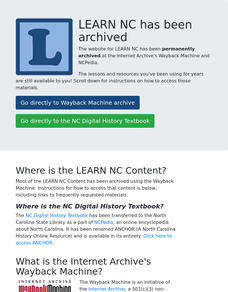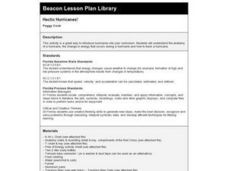NASA
The Case of the Wacky Water Cycle
Join the tree house detectives in learning about the processes of the water cycle, water conservation, water treatment, and water as a limited resource.
Micron Technology Foundation
Early - Weather and Seasons
Young scientists from any region can take a scientific journey and be exposed to weather changes that include rain and snow.
Do2Learn
Calendar: Days & Weather
This small set of picture cards can help learners know what to expect with certain types of weather (i.e. rain, wind, snow, etc.), as well as what type of weather comes during the different days and months of the year.
Core Knowledge Foundation
Weather or Not, Seasons Change
Embark on a year long investigation of the seasons with this 10-lesson earth science unit. After being introduced to different types of weather and the tools used to measure it, young scientists perform fun hands-on activities that teach...
Core Knowledge Foundation
A Time for All Seasons - Winter
As the days get shorter and a chill enters the air, it's time to start teaching your little ones about the wondrous winter season. Through a series of teacher demonstrations, whole-class read alouds and discussions, and hands-on...
Core Knowledge Foundation
A Time for All Seasons - Fall
The weather is cooling down and the leaves are starting to change color; fall is right around the corner. Celebrate this special time of year with this earth and life science lesson series that teaches children about the causes of...
Core Knowledge Foundation
A Time for All Seasons - Summer
The sun is shining and the birds are singing, what better time to teach young learners about the fun season of summer. In this week-long science series, children learn how the rotation and orbit of the earth influence the days and...
Core Knowledge Foundation
A Time for All Seasons - Spring
Celebrate the arrival of spring with this fun primary grade science unit. Engaging young scientists with a variety of hands-on activities and inquiry-based investigations, these lessons are a great way to teach children about seasonal...
North Carolina Museum of Natural Sciences
Weather Watch Activity Guide: Groundhog Day
Exactly what do groundhogs know about weather? Not as much as your science students will after completing these lessons and activities that cover everything from the earth's rotation and the creation of shadows, to cloud...
Discover Earth
Weather Stations
Transform your classroom into a fully functioning weather station with this series of hands-on investigations. Covering the topics of temperature, precipitation, wind patterns, and cloud formation, these activities engage young...
Curated OER
Matter
Second graders read the book The Mitten and discuss the changing weather and appropriate clothes to wear in certain kinds of weather. For this weather lesson plan, 2nd graders also have a literature, writing, and math component to the...
Curated OER
The Weather Around Us
First graders explore weather patterns. In this weather lesson, 1st graders research the daily weather by creating a graph of the daily weather conditions. Students use the computer to access information regarding the weather forecast....
Curated OER
Checking the Weather
Students check the weather on the web site, draw what they see on the calendar (sunny, cloudy, rainy, snowy) and look outside to see if they think the weather on the web site is correct.
Curated OER
Hectic Hurricanes!
Pupils determine what they know about hurricane formation. They experiment to explain hurricane formation and track a hurricane that forms in the Caribbean Islands.















